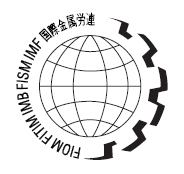Related Research Articles

The International Confederation of Free Trade Unions (ICFTU) was an international trade union. It came into being on 7 December 1949 following a split within the World Federation of Trade Unions (WFTU), and was dissolved on 31 October 2006 when it merged with the World Confederation of Labour (WCL) to form the International Trade Union Confederation (ITUC).

The World Federation of Trade Unions (WFTU) is an international federation of trade unions established in 1945. Founded in the immediate aftermath of World War Two, the organization built on the pre-war legacy of the International Federation of Trade Unions as a single structure for trade unions world-wide. With the emergence of the Cold War in the late 1940s, the WFTU splintered, with most trade unions from the Western-aligned countries leaving and creating the International Confederation of Free Trade Unions (ICFTU) in 1949. Throughout the Cold War, membership of the WFTU was made up predominantly of trade unions from the Soviet-aligned and non-aligned countries. However, there were notable exceptions to this, such as the Yugoslav and Chinese unions, which departed following the Tito-Stalin and Sino-Soviet splits, respectively, or the French CGT and Italian CGIL unions, who were members. With the end of the Cold War and the dissolution of the Soviet Union, the WFTU lost the largest portion of its membership and financial support. Since the start of the 2000s, the organization shifted headquarters to Athens and recruited new members, claiming to have grown from representing 48 million workers in 2005 to 105 million in 2022.

The World Confederation of Labour (WCL) was an international labour organization founded in 1920 and based in Europe. Totalitarian governments of the 1930s repressed the federation and imprisoned many of its leaders, limiting operations until the end of World War II. In 2006 it became part of the International Trade Union Confederation (ITUC), ending its existence as an independent organization.

The International Metalworkers' Federation (IMF) was a global union federation of metalworkers' trade unions, founded in Zürich, Switzerland in August 1893. As of 2009, the IMF had more than 200 member organisations in 100 countries, representing a combined membership of 25 million workers.

The Ghana Trades Union Congress is a national centre that unites various workers' organizations in Ghana. The organization was established in 1945.
The Plantation Workers International Federation was an international trade secretariat of the International Confederation of Free Trade Unions. PWIF was founded at the firth ICFTU world congress held in Tunis in July 1957. Samuel Powell Claret was appointed as the general secretary of PWIF and Tom Bavin as its Director of Organisation. PWIF was launched by ICFTU to organize plantation unions in the Third World.
The Trade Unions International of Miners was a trade union international affiliated with the World Federation of Trade Unions.

The Trade Unions International of Chemical, Oil and Allied Workers was a trade union international affiliated with the World Federation of Trade Unions. It was often known by its French initials, ICPS.

The International Federation of Chemical, Energy and General Workers' Unions (ICEF) was a global union federation of trade unions.
Amos N. Gray was a Liberian trade unionist. Born in Pull River, Maryland County, Gray attended primary school in Pull River and secondary school in Harper. He attended college in Monrovia, studying social studies for two years and law for one year. During his college years he worked part-time at the Freeport of Monrovia. Working at the port in 1960, he joined the Maritime and Dock Workers Union. After his college years he worked at the Maritime and Dock Workers Union office in Monrovia.

The International Graphical Federation (IGF) was a global union federation bringing together unions of printing workers around the world.
The International Clothing Workers' Federation (IGWF) was a global union federation representing workers involved in making and repairing clothes.
The International Union of Hotel, Restaurant and Bar Workers (IUHR) was a global union federation bringing together trade unions representing hospitality workers.
The International Federation of Free Teachers' Unions (IFFTU) was a global union federation of trade unions representing teachers.
The International Federation of Variety Artists (IFVA) was a global union federation bringing together trade unions representing entertainers other than musicians and actors.
The International Federation of Trade Unions of Audio-Visual Workers was a global union federation bringing together unions representing film and television technicians and related workers.
The ICFTU European Regional Organisation (ERO) was a regional trade union confederation, bringing together national federations of trade unions in Europe.
The World Federation of Industry Workers (WFIW) was a global union federation representing workers in a range of primary and secondary industries.
The Federation of Chemistry was a trade union representing workers in chemical and related industries in Italy.
Orie Albert "Jack" Knight was an American labor unionist.